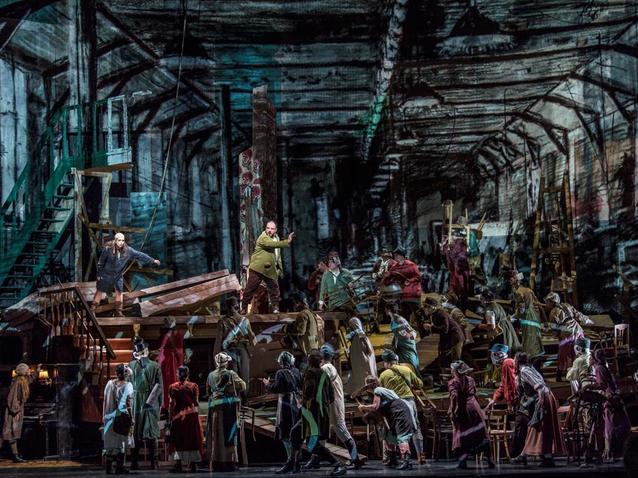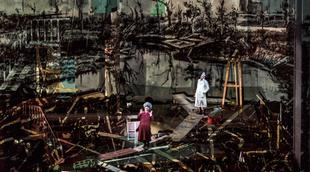 Wozzeck (© Salzburger Festspiele / Ruth Walz)
Wozzeck (© Salzburger Festspiele / Ruth Walz)
In the 18th century there was pain and misery, but art generally displayed the beauty of the world. In the 19th century there was also pain and misery and art showed a part of it. In the 20th century there was a lot of pain and a lot of misery and very often art became unpleasant because the artist felt the need to show the world all the unnecessary pain, the avoidable misery, the great alienation and violence that govern human relationships. For many artists, failing to do this would have been a guilty omission.
The opera Wozzeck, composed a hundred years ago by Alban Berg, is colossal, genius, truly innovative, sad, sordid, unpleasant and uncomfortable. It belongs to the group of pieces of horrible beauty that show the world its own ugliness.
In order to bring Wozzeck to the stage, Liceu turned to the production from the Salzburg Festival premiered in 2017 and signed by William Kentridge. As would be expected from an artist who is worldly renowned in the fields of drawing and animation, Kentridge’s Wozzeck is sharply visual. The scene, which doesn’t change much throughout the opera, shows an enormous and apparently shapeless pile of civilisation remains, including damaged chairs, old wardrobes, abandoned suitcases, broken pieces of wood. Amongst these run ramps and stairs that effectively create scenic spaces through which characters move.
The appearance of the ensemble resembles that of an urban landscape after a bombing and the temporal location chosen is that of devastated Europe after War World I, which coincides with the moment when Berg created his Wozzeck from Buchner’s theatre play.
Over the surfaces of this chaotic space, images in motion and terrifying and deeply painful drawings are constantly projected, referencing mainly the journey of the main character towards insanity.
Whilst the visual aspect of Kentridge’s proposal is captivating, the dramaturgy isn’t left behind and makes the most of the great provocative and upsetting potential of the piece. Wozzeck, who will end up murdering his wife is himself a compassion evoking victim. The captain and the doctor, the incarnation of the power that exploits and abuses, are grotesque and caricature-like characters who live detached from the suffering they inflict on the world. The greatest gem in Kentridge’s proposal lies in representing Wozzeck and Marie’s son, victim amongst victims, as a puppet with a gas mask.
The musical outcome of this Wozzeck was hugely satisfactory. Josep Pons navigates well the 20th century repertoire, which he began working in before the century had finished. Wozzeck, is musically placed in an almost impossible point of balance between a lingering late romantic expressivity, expressionism, and an atonality where occasionally appear veiled small tonal episodes. The orchestral demands of the score are extremely high, both rhythmically and harmonically. Pons managed to bring the orchestra to achieve a great sound, with a chamber sonority appropriate to the piece and with sudden dynamic explosions, mainly in the interludes between scenes.
The interpretation of the main character was given to Matthias Goerne. The German baritone, who had previously offered a memorable performance of Britten’s War Requiem at Liceu this season, participated in the premiere of this production in Salzburg in 2017 and knows it inside out.
Goerne not only has a Wozzeck voice, he is Wozzeck, innocent, brutal, elementary and wise. The lost gaze of the character whilst journeying without return into alienation is one of those that isn’t easily forgotten.
Next to him, Annemarie Kremer managed to skilfully incorporate all the angles – affectionate, bitter, seductive, panicked – of Marie’s complex character. Her performance was totally satisfactory.
Mikeldi Atxalandabaso did a memorable Captain and Peter Rose a sufficient Doctor. Torsten Kerl in the role of Drum Major, Peter Tantsits as Andres, Rinat Shaham as Margret and Beñat Egiarte in the role of the mad man didn’t disappoint either. The choir also did well in its small intervention.
Wozzeck is primarily a team opera, rather than a stars’ show, and in this case the whole team worked well together to sign a performance which will without a doubt become one of the landmarks of the season.
Xavier Pujol
Barcelona, 22nd May 2022
Wozzeck at the Gran Teatre del Liceu, Barcelona, 22nd May - 4th June 2022
Wozzeck by Alban Berg. Matthias Goerne, baritone. Annemarie Kremer, soprano. Mikeldi Atxalandabaso, tenor. Peter Rose, bass. Torsten Kerl, tenor. Peter Tantsits, tenor. Rinat Shaham, mezzosoprano. Scott Wilde, bass. Äneas Humm, baritone. Beñat Egiarte, tenor. Orchestra and Choir of Gran Teatre del Liceu. Vivaldi Choir –IPSI School. Josep Pons, conductor. William Kentridge, stage director. Luc De Wit, stage co-director. Sabine Theunissen, scenography. Greta Goiris, costumes. Urs Schönebaum, lighting. Production by Salzburger Festspiele. Gran Teatre del Liceu. Barcelona, 22nd May 2022.
Credit: © Salzburger Festspiele / Ruth Walz
the 24 of May, 2022 | Print

Comments